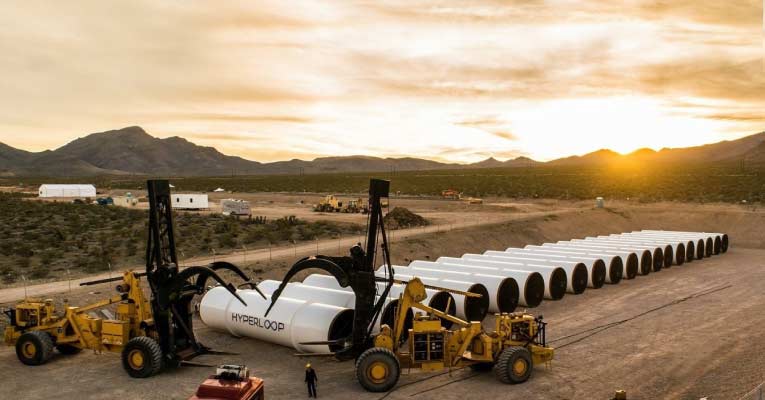FROM MAGAZINE: Freight sector fastens belt for Hyperloop

Flying cars and jetpacks could still take time to become a reality, but Hyperloop seems all set to revolutionize the transportation industry. The freight sector could be the first beneficiary of this super speed technology. Shreya Bhattacharya
It might sound like a scene straight from a sci-fi flick, but hyperloop could soon turn an eternal fantasy of us- human beings, of having command over time and speed, into a reality.
Apart from flying cars and jetpacks that we have fantasized becoming the future modes of transportation, Hyperloop has reached a stage, where it could turn itself from a hypothetical concept into a reality, hopefully, as experts believe, within a decade or so. Two companies- Hyperloop Transportation Technologies and Hyperloop One, are racing to make it real.
A brainchild of Tesla Motors and SpaceX CEO Elon Musk, Hyperloop is a futuristic technological concept that would ensure high speed transportation of passengers and cargo in suspended capsules through miles-long near-vacuum tubes. The capsule could achieve the speed of 700 miles, or 1,120 kilometers, an hour and would be powered by solar panels installed on the roof supplying it with a clean and self-powering system.
Musks’ idea of this “fifth form of transportation”, has not only caught the fancy of travelers, but it has also become the latest buzzword in the freight sector. Futurists and major players in the sector see this technology provide rapid cargo transit networks in the future, connecting far-off cities, dodging the vehicular congestion on roads and thus improving efficiency. It would also contribute in reducing pollution, significantly in port-adjacent areas.
DP World, one of the world’s largest port-terminal operators, has signed an agreement announcing a partnership with Hyperloop One Inc.- one of the two companies working on the technology.
The two would assess the technical feasibility of using Hyperloop for unloading ocean-container cargo at the DP World’s flagship Jebel Ali port in Dubai and sending it to an inland depot, without impacting the vehicular traffic on roads. Swift transportation of cargo would create more space on the docks that otherwise remain congested. All aspects including the efficient handling of containers, costs, benefits, demand and volume patterns of moving cargo using the new technology are being explored.
“At DP World, we continually strive to think ahead and foresee change to create the most efficient, safe and profitable trade solutions. With this collaboration, we’re leading innovation in our industry once again and by testing the Hyperloop technology at Jebel Ali for cargo use, we’re taking a first step in exploring new ways of enabling trade and underlining Dubai’s commitment to innovation,” DP World Group Chairman and CEO Sultan Ahmed Bin Sulayem said in a press statement.
“The world is changing at a pace never seen before in our history and we intend to be part of a new revolution in transport, connecting markets and economies around the world. This is an example of leading innovation in our industry and pushing the boundaries in the delivery of goods,” he said.
“We are delighted to be part of the vision of His Highness Sheikh Mohammad Bin Rashid Al Maktoum, Vice-President and Prime Minister of the UAE and Ruler of Dubai, to make the UAE and Dubai a centre for innovation, continuing to grow its reputation for investment in smart technologies, to make life easier for societies and people around the world,” he added.
A floating hyperloop alternative for the Jebel Ali port is also being considered so that the containers could directly be taken from the ship, placed into the tube, and transported to an inland hub rather than requiring handling and taking up space on the docks.
“Hyperloop One is pleased to extend our global footprint into the Middle East with the signing of the MOU with the United Arab Emirates and DP World. This partnership allows us to embrace the innovation of the UAE and to utilise the creativity of DP World, while expanding the variety of use cases for Hyperloop,” Rob Lloyd, CEO, Hyperloop One said.
Hyperloop One is also conducting separate freight-related feasibility studies in the US, Switzerland and Russia.
Along with DP World, Hyperloop One has collaborated with US based firms GRID Logistics. which specializes in transporting cargo from ports to inland warehouses, and engineering firm AECOM, to evaluate how practical is this futuristic speed-of-sound transportation technology at the Ports of Los Angeles and Long Beach, the largest container port complex in the U.S.
Meanwhile, competitor Hyperloop Transportation Technologies on its part is working on its own Hyperloop version. The firm is working on a technology named “passive magnetic levitation technology” which it says would be more cost effective and safer than traditional maglev, that one finds in high-speed trains in Europe and Japan.
Although Hyperloop has the potential to solve many of today’s most complex long-distance transport issues, it also has its own set of challenges to handle. Engineering and technical issues to maintain the track and capsules, land acquisition and huge infrastructural requirements are some major challenges that the project could face, leading its expenditure run into billions.
However, if successful, the technology also has the capability to transform the freight sector entirely and change the outlook towards logistics and supply chain, especially at a time when there is growing concern over environmental damage caused by other transport facilities.




